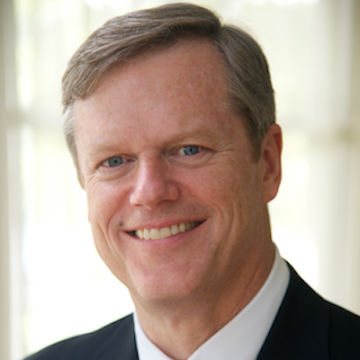Gov. Baker Files New Substance Use Legislation, MA Medical Society Has Concerns
Friday, October 16, 2015

Governor Charlie Baker
“Combatting the opioid epidemic in the Commonwealth calls for a comprehensive approach, and filing today’s landmark legislation is a critical step toward creating more effective treatment pathways and better controlling opioid prescribing practices for first-time patients,” said Governor Baker.
The bill calls for new requirements for practitioners, educators and communities and amends the civil commitment statute, section 35, to say that women committed for substance use treatment may be sent to new secure treatment units approved by the Departments of Public and Mental Health.
Shortly after the legislation was unveiled, the Massachusetts Medical Society released a statement applauding the Governors effort but raising concerns about the bill.
The statement comes from Dennis Dimitri, M.D., president of the Massachusetts Medical Society.
Read the Statement Below
The Massachusetts Medical Society recognizes the severity of the opioid abuse problem in Massachusetts and applauds the Governor’s efforts at educating parents and students and improving treatment options for those with substance use disorder.
The Governor’s bill proposes some bold actions, some of which we will have to consider with care and caution. We will have to build the infrastructure and provide the resources to have the capacity to do what is needed.
Yet we have deep concerns about sections of the bill that are directed at prescribers, specifically new proposals that fail to allow efforts recently put into place to demonstrate their effectiveness and that may undermine those programs already in place.
Physicians are already required by state regulations to take continuing medical education (CME) courses in pain management and opioid prescribing for license renewal. Further, since May 26, when the Massachusetts Medical Society made its CME courses available free to all prescribers as a response to the opioid epidemic, 1,955 prescribers have taken a total of 4,785 courses. It is unclear whether the Governor’s proposal is in addition to what the regulations already require.
The limitation of a 72-hour supply of pain medication is another concern, as it could impede the effective pain management of patients, though the bill does allow for the “professional medical judgment of the practitioner” to prescribe more in emergency conditions. This limitation undermines clinical judgment that may be necessary in non-emergency situations.
The requirement to check the Prescription Monitoring Program every time before prescribing an opiate, while possibly appropriate for physicians seeing a patient for the first time, appears to disregard long-standing physician-patient relationships. The Massachusetts Medical Society has long advocated for a streamlined monitoring program and has worked with the Department of Public Health in recommending changes to improve the program.
We recognize that substance use disorder and addiction is a disease, but we believe the involuntary commitment portion of the bill is problematic, as it raises issues of civil liberties, as well as present unintended consequences, as it may discourage patients from getting needed treatment.
The Massachusetts Medical Society has taken multiple steps to address the opioid epidemic by (1) issuing prescribing guidelines that have been subsequently adopted by the Board of Registration in Medicine, (2) adding continuing medical education courses and making them free for all prescribers to educate physicians, (3) working to improving the Prescription Monitoring Program, (4) educating patients about safe storage and disposal through a dedicated website and public service print and television programs, and (5) working with the Department of Public Health and the four Massachusetts medical schools to enhance medical school curricula in addressing pain management, safe prescribing, and addiction prevention and treatment.
It is important to recognize that the diversion and abuse of prescription opioids has plateaued or decreased from 2011-2013, according to the New England Journal of Medicine (January 15, 2015) and that the supply of opioids and heroin is increasingly coming from sources outside the medical system.
Physicians have stepped up their efforts in the fight against opioid abuse and are on the forefront of screening for substance use and treating those with substance use disorder. We have worked with Governor Baker, Attorney General Healey, Public Health Commissioner Bharel, and the Board of Registration in Medicine in addressing the opioid epidemic.
The opioid epidemic is a complex problem that defies simple solutions. All physicians are committed to addressing the problems of prescription misuse, abuse, and addiction, and we will continue to work with government, legislative, and public health officials to reduce the abuse of prescription medications affecting patients in the Commonwealth.”
Related Slideshow: MA Doctors - See Who Prescribed the Most Oxycodone
Related Articles
- Baker Calls on National Guard, Requests More Equipment for Snow Removal
- Governor Baker: MBTA Performance ‘Simply Unacceptable’
- NEW: Governor Baker Unveils Fiscal Year 2016 Budget Proposal
- Giorgio: Charlie Baker is Wrong on the Film Tax Credit
- Governor Baker Closes State Offices for Monday Due to Storm
- Mass Dems Accuse Baker of Flip-Flop in #PromisesWatch Campaign
- Governor Baker Extends Mass Health Connector Deadline to January 30
- Governor Baker Declares State of Emergency and Driving Ban
- Governor Baker Lifts Travel Ban at Midnight
- Governor Baker Bets Cupcakes on Patriots Win to Support Food Pantries
- Baker and Polito Seek Federal Assistance to Cover Costs from Record Snowfall
- Evangelidis to Swear-In Baker and Polito as Deputies Tonight
- Owners of Widoff’s Bakery Building Reveal Plans for Retail and Office Space
- Baker Wants More Charter Schools While State Owes Millions to School Districts
- Baker and Polito to Tour Community Harvest Project in Grafton
- Governor Baker Announces Legislation to Expand Charter Schools
- Giorgio: Governor Baker & the Opiod Crisis
- Senators Chandler and Moore Join Legislature in Override of Baker’s Vetoes
- Photos: An Exclusive Look Inside the Famous Widoff’s Bakery in Worcester
- Baker Will Be Keynote Speaker for 50th Anniversary of Worcester Organizations
- NEW: Governor Baker Approves Sale of Medical Marijuana in MA
- Governor Baker Names McKeon New Head of Mass State Police
- EXCLUSIVE: New Owner Reveals Plans for Worcester’s Famous Widoff’s Bakery






















Follow us on Pinterest Google + Facebook Twitter See It Read It